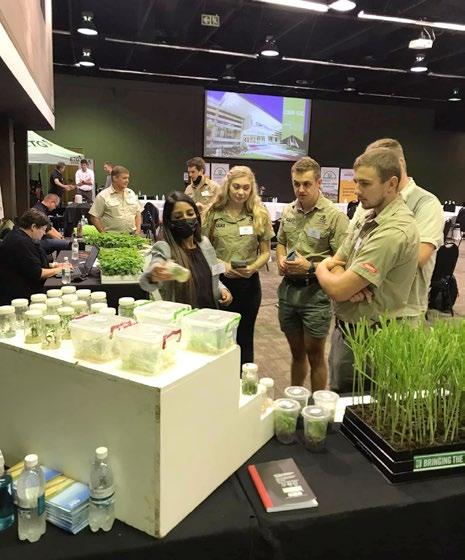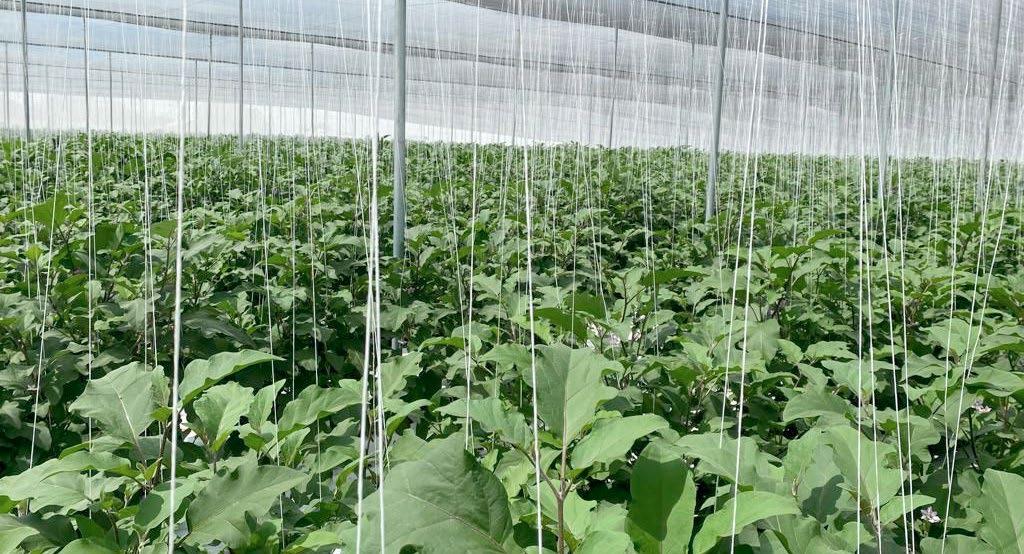
5 minute read
The New Voices of Agriculture: Young, Diverse Innovative
Young FPEF graduates in a greenhouse.
Transformation is a complex phenomenon linked with many different interpretations. There are several key strategies to facilitate transformation and inclusion in any given industry. Skills development is one of the many ways the South African agricultural industry has chosen to embrace.
Advertisement
Along the value chain, the South African government has developed programmes to welcome graduates in the agricultural industry. Equally, the private sector has implemented its programmes such as the FPEF Graduate Placement Programme. Implementation of transformation programmes demands prioritisation and dedicated personnel who are equally passionate about the subject matter. We had the opportunity to discuss transformation and graduate placement with the FPEF Transformation manager, Johannes Brand. Racial unity has been a personal passion since his days in Zimbabwe. He elaborated that he would like to see South Africa overcoming its bitter history of apartheid and creating a healthy integrated society.
The FPEF Graduate Placement
Programme specifically aims to place high-calibre, black, tertiary graduates in junior commercial, logistics and technical roles in South African fruit export companies. According to Johannes, the programme focuses on the second part of the value chain, which is in line with the FPEF’s mandate as their members are primarily fresh produce exporters and logistic companies. However, it is important to note that different organisations have internships that specifically serve their members. Johannes encouraged graduates to look for opportunities within the industry they wish to go into. For example, during his university days, he identified that the fresh produce export industry was growing, and thereafter he targeted fresh produce export companies when he was applying for a bursary.
The FPEF Graduate Placement
Programme hit a landmark last year (2021), with the appointment of 14 graduates in FPEF member companies, bringing the total to 48 since the programme launched in 2016. One of the 2021 FPEF interns, Zama Sangweni, firmly believes that an internship is an amazing opportunity for young people to get their foot into the industry. She elaborated further by saying: “The emergence of an initiative like the FPEF internship has changed my life for the better and has given me a platform to showcase my skills. The unemployment rate is high in this country and seeing industry stakeholders do something about
it is remarkable”. One of the advantages of this programme is fair payment. Zama applauded the FPEF organisation for addressing the elephant in the room by encouraging member companies to pay graduates market related salaries. In addition to the graduate placement programme, the FPEF hosts the FPEF Annual Transformation Seminar, to encourage business leaders to engage in transformation discussions.
She said: “Business leaders are the decision-makers who have the power to transform the businesses they lead. It is more effective than a bottomup approach to rather encourage shareholders and executives to lead transformation”.
The structure of internships differs at each company based on their needs and support structures. At BerryWorld South Africa, Zama had the opportunity to spend three months in four different departments within the company. These included pre-harvest, sales and compliance, logistics and supply chain, and finally the post-harvest department. According to Zama, this internship format gave her an overview of the functions of the entire business. When we asked Zama, who is currently a marketing assistant at BerryWorld, South Africa, which agricultural sector drew her interest the most, she commented that her internship exposed her to different company departments, and therefore she was able to identify her strength in agricultural marketing and compliance. She further elaborated: “Marketing has enabled me to express my creative and innovative edge and how to strategically portray the brand in such a way that promotes our company values. Compliance extends my interest because I work with the sustainability part of the business and this ensures that our business is food safe, ethical and is adding unmeasurable and intangible value to the wider world.”

Although the agricultural industry is embracing young people and growing their own timber, it would be naïve to think that the sequence is linear, black graduate internship opportunity. The truth of the matter is that graduates must bring something to the table. According to Johannes, although having an agriculture degree is not mandatory, what distinguish a candidate from the next one are attitude, character and showcasing your key strengths. He added that the First-Year working will be a learning curve as you gain your footing and get an understanding of your industry and the tasks given to you. Additionally, Zama stated that what set her apart is her confidence, curiosity and consistent and energetic work ethic. Further Zama elaborated and said: “If I am not knowledgeable on the subject matter, I am curious enough to find out about it”.
“To conclude, I would like to encourage you to identify the sector you wish to be part of, as it is no longer enough to just say, “I want to be in agriculture”. Break it down to commodity (for example citrus or blueberries) and thereafter learn about opportunities within the specific organisation or company that represents that commodity,” said Zama. Visit recruiting agencies and companies’ websites regularly and identify skills you should be developing. Both Johannes and Zama emphasised the importance of networking and job shadowing as tools to understand the industry better and create opportunities for yourself. Compiled by: Makhosazana Shantelle Ngwenya – AgriJob Blog Coordinator
Technical experience adds value to young graduates who wish to fulfil their dreams in agriculture.

Subscribe now!
Electronic subscription for 6 bi-monthly issues is R 350.00 (ZAR) annually
Email the details as outlined here to subscribe for your bi-monthly copy of Undercover Farming!
Send this information to magazine@axxess.co.za with your subscription deposit proof of payment.
For more information contact Marion Oosthuizen (+27) (0) 71 693 9300 or e-mail management@axxess. co.za NAME:
SURNAME:
ADDRESS:
CODE:
CONTACT NUMBER: EMAIL ADDRESS:






